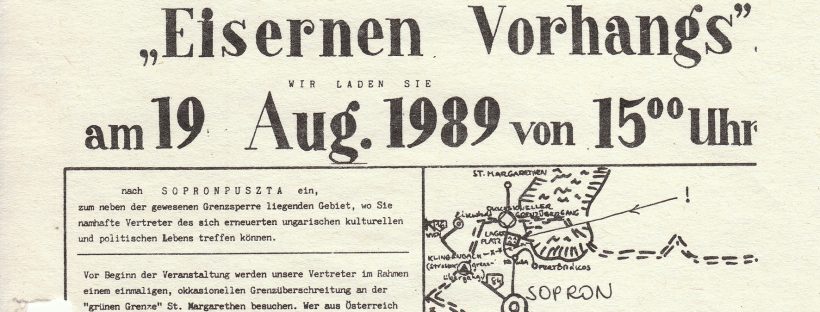Das Paneuropäische Picknick und seine Botschaft für Europa / The Pan-European Picnic and Its Message for Europe
Das Paneuropäische Picknick vom 19. August 1989 an der österreichisch-ungarischen Grenzen läutete das Ende der Teilung Europas in einen vom Moskauer Kolonialreich kontrollierten Osten und einen freien Westen ein. Die europäische Einigung sollte damit allem europäischen Völkern und Staaten offen stehen.
36 Jahre nach dem historischen Ereignis sieht es so aus, als wären die Gespenster dieser Teilungspolitik wieder aktiv. Dem muss die Europäische Union mit einer klaren Politik entgegentreten, die folgende Schwerpunkte beinhaltet:
Die Erweiterungspolitik ist ein Teil einer strategischen europäischen Außenpolitik.
Europa statt Nationalismus.
Freiheit statt Totalitarismus.
Rechtsstaatlichkeit statt politischer Willkür.
Friedenspolitik statt Kriegspolitik. Das bedeutet aber, dass der Angegriffene das Recht zur Verteidigung hat, dass die freie Welt das Recht oder gar die Pflicht hat, den Angegriffenen zu unterstützen. Wäre das nicht so, würden ja die Botschaften Freiheit statt Totalitarismus und Rechtsstaatlichkeit statt politischer Willkür konterkariert, weil der Aggressor sich durchsetzen würde.
Das damals noch von den Kommunisten regierte Ungarn hat das Paneuropäische Picknick möglich gemacht. „Es ist eine historische Schande“, so Rainhard Kloucek, Präsident der Paneuropabewegung Österreich, „dass nun die aktuelle Regierung genau dieses Landes Ungarn dem Nachbarn Ukraine seine Freiheitsrechte – damit meine ich die territoriale Integrität sowie den Beitritt zur EU und auch zur Nato – verwehren möchte.“
Eine umfassende Bewertung des Paneuropäischen Picknick und seine Bedeutung für die Freiheit Europas kann hier nachgelesen https://www.paneuropa.at/das-picknick-und-seine-bedeutung-fuer-die-freiheit/#more-3359 und hier nachgehört werden: https://www.youtube.com/watch?v=2r4MDaoWhjw&t=13s
The Pan-European Picnic on August 19, 1989, on the Austro-Hungarian border initiated the end of the division of Europe into an East controlled by the Moscow colonial empire and a free West. European unification was thus intended to be open to all European peoples and states.
36 years after the historic event, it appears as if the ghosts of this policy of division are active again. The European Union must counter this with a clear policy that includes the following priorities:
Enlargement policy is part of a strategic European foreign policy.
Europe instead of nationalism.
Freedom instead of totalitarianism.
Rule of law instead of political arbitrariness.
A policy of peace instead of a policy of war. This means, however, that the attacked party has the right to defend itself, and that the free world has the right, or even the duty, to support the attacked party. If that weren’t the case, the messages of freedom instead of totalitarianism and the rule of law instead of political arbitrariness would be counteracted because the aggressor would prevail.
Hungary, then still ruled by the communists, made the Pan-European Picnic possible. „It is a historic disgrace,“ said Rainhard Kloucek, President of the Pan-European Movement Austria, „that the current government of precisely this country, Hungary, now wants to deny its neighbor Ukraine its civil liberties – by that, I mean territorial integrity and accession to the EU and Nato.“


